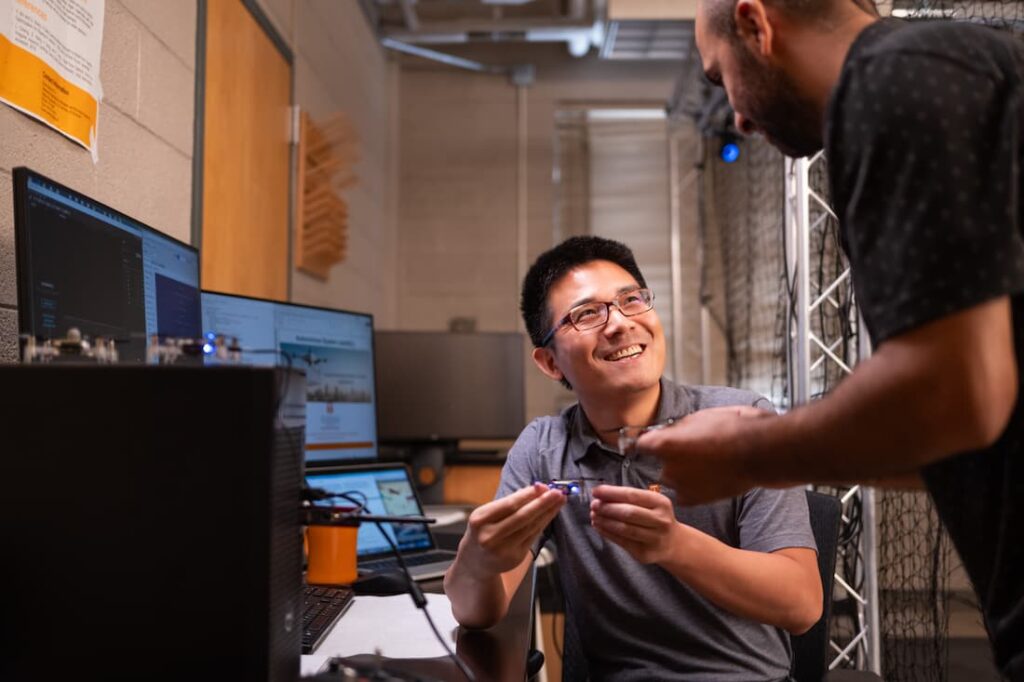
Human Interaction and Intelligent Systems, Minor
The Human Interaction and Intelligent Systems minor offers students a unique approach to understanding the relationship between humans and AI-driven technologies. Through a blend of design, psychology, and computing, students gain hands-on experience in developing intelligent systems that prioritize usability, accessibility, and ethical considerations.


Why study Human Interaction and Intelligent Systems?
Career Readiness
Be prepared to enter the fast-growing field of human-computer interaction (HCI) and intelligent systems. By combining technical skills with user-centered design principles, you will be equipped to tackle challenges in AI development, ensuring you are ready to make an immediate impact .
Hands-On Learning
Engage in hands-on projects where you can design, prototype, and test intelligent systems. Through these practical experiences, you will apply what you have learned in real-world scenarios, preparing you to meet the needs of diverse industries such as healthcare, education, and public services.
Specialize Your Interests
Tailor your coursework to your specific passions, whether in UX design, AI ethics, intelligent system development, or beyond. The flexible curriculum encourages exploration across fields, enabling you to develop specialized knowledge in areas that align with your career goals.
Career Opportunities
Pursue careers in a range of industries where human-computer interaction and intelligent systems are critical. Develop the skills needed to thrive in tech-driven environments. Career paths include UX designer, AI product manager, human factors specialist, and data visualization specialist, among many others.
Real-World Learning
Gain real-world experience by working on a hands-on capstone project, collaborating with peers to design and test intelligent systems that address practical challenges. Apply your knowledge to solve actual problems, ensuring you are well-prepared for the future of work.
Transferrable Skills
Develop valuable, sought-after, and transferable skills such as critical thinking, problem-solving, design thinking, and teamwork that can be used across industries and sectors.
What can you do with a Human Interaction and Intelligent Systems minor?
A minor in Human Interaction and Intelligent Systems prepares students for roles at the intersection of AI, design, and user experience.
User Experience (UX) Researcher
UX Researchers conduct studies to understand how users interact with intelligent systems and technologies. They analyze user behavior and feedback to improve system usability, making sure that the systems meet the needs and expectations of diverse user groups.
AI Interaction Designer
AI Interaction Designers focus on how users engage with AI-driven technologies. They design intuitive interfaces and workflows that make AI applications accessible and efficient, ensuring users can interact with systems seamlessly.
Ethical AI Consultant
An Ethical AI Consultant helps organizations navigate the ethical challenges associated with implementing AI technologies. They ensure that systems are designed responsibly, taking into account issues such as fairness, transparency, and privacy concerns in AI decision-making processes.
Human Factors Engineer
Human Factors Engineers focus on optimizing how users interact with systems, combining psychology, engineering, and design to improve the functionality, safety, and accessibility of intelligent systems. They work in various industries such as healthcare, automotive, and technology to create systems that work in harmony with human abilities.
Featured Course
This featured course provides students with a deep understanding of the intersection between intelligent systems and human interaction, equipping them with the skills to design, evaluate, and implement user-centered AI technologies.
HCI 201
Foundations of Intelligent Systems and Human Interaction
This course provides an overview of intelligent systems and their impact on human-computer interactions, covering foundational AI concepts, machine learning, and user-centered design. Students will explore how these technologies shape user experiences and decision-making, and develop skills to design intuitive, accessible, and ethical systems through lectures, hands-on activities, and collaborative projects.
Related Programs, Certificates & Minors
CECS offers innovative, customizable majors, minors, and certificates in areas of emerging technology and the skills required by the workforce of the future.

Admissions and Aid
Learn more about admissions and aid by visiting the links below.

Request Information
Interested in learning more? Contact us!
Questions? We’re here to help.
If you have questions about the Data Science minor or navigating the application process, contact us.




